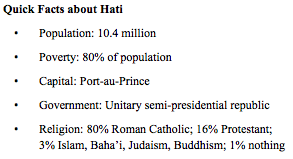By Sue Sprang
ELK RAPIDS/HAITI – Elk Rapids may be a village tucked into Michigan’s northern Lower Peninsula, but there is no lack of “reaching beyond” for the members of Calvary Lutheran and St. Paul’s Episcopal Churches and the Elk Rapids Rotary Club.

Inspired by Lutheran World Relief and Episcopal Relief & Development, and working with Pure Water for the World, Elk Rapids Rotarians are bring clean, safe water to Haiti. – photo courtesy preparednesspro.com
Although all three organizations have been involved with mission projects through Lutheran World Relief (LWR), Episcopal Relief & Development (ERD), and Good Works Projects (Rotary), it was an annual Rotary event that drew them together to bring drinkable water to Haiti.
“I am enthusiastic and celebrate the apparent cooperation/collaboration between the Lutheran and Episcopal Churches and the Rotary to help the people in Haiti obtain access to clean drinking water,” said Dean Branson, a member of Calvary-St. Paul’s and the Rotary, “but, in truth, these initiatives are more coincidental than planned collaborations.”
It began with the annual Variety Show fundraiser sponsored by the Elk Rapids Rotary. The event booklet described ERD’s and LWR’s programs. The $230 cost of the ad was paid by a few Rotarians or Friends of the Library who are also members of Calvary-St. Paul’s.
Rotary members were impressed with what they read about ERD and LWR – and felt called to join the effort to bring safe drinking water to Haiti. Homework was done, funds raised (including from The Rotary International Foundation and various local rotaries), Pure Water for the World (PWW) was brought on board.
The results?
From February – June 2014, PWW implemented a clean water and hygiene education program in Haiti’s Trianon rural area (about 1 1/2 miles northeast of Port-au-Prince). The region uses river, unprotected well, rainwater, and runoff water in canals for its primary water source. Diarrheal disease is common, particularly among children.
PWW’s program reached 300 homes and 1,922 people. Program elements included hygiene education, installing Biosand water filters, and training of 60 local community agents to support families in the proper use and maintenance of the filter and in ongoing safe hygiene practices.
“We like this water project in Haiti in part because of the way Pure Water for the World incorporates the critical elements of a successfully sustainable program that significantly reduces the incidence of waterborne disease through sanitation, education, and a bio-sand filter for each home,” said Branson.
“We are particularly inspired by the leveraging of the funds to accomplish these objectives,” he added. “This year we anticipate another major water project in Trianon that involves even more leveraging of funds from the Rotary National Foundation.”
Find out more about Pure Water for the World at www.purewaterfortheworld.org.
